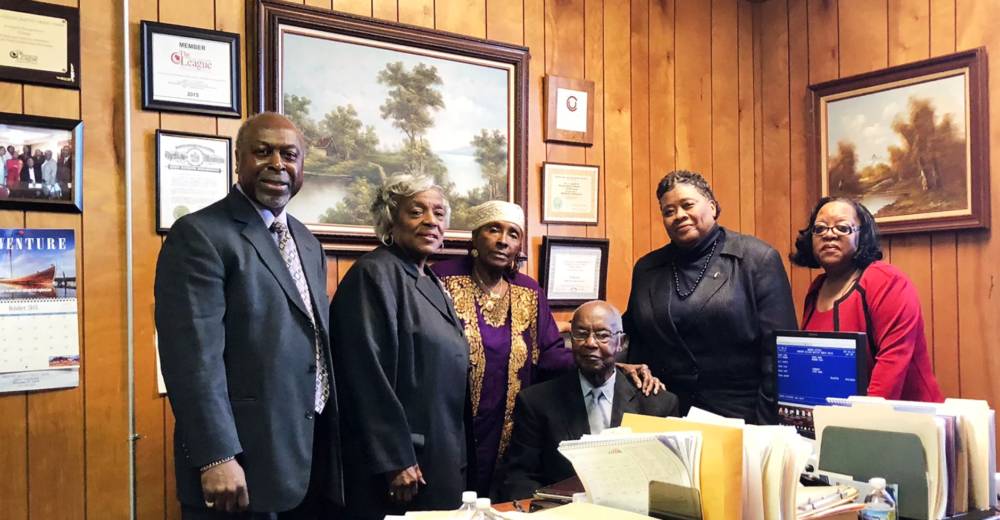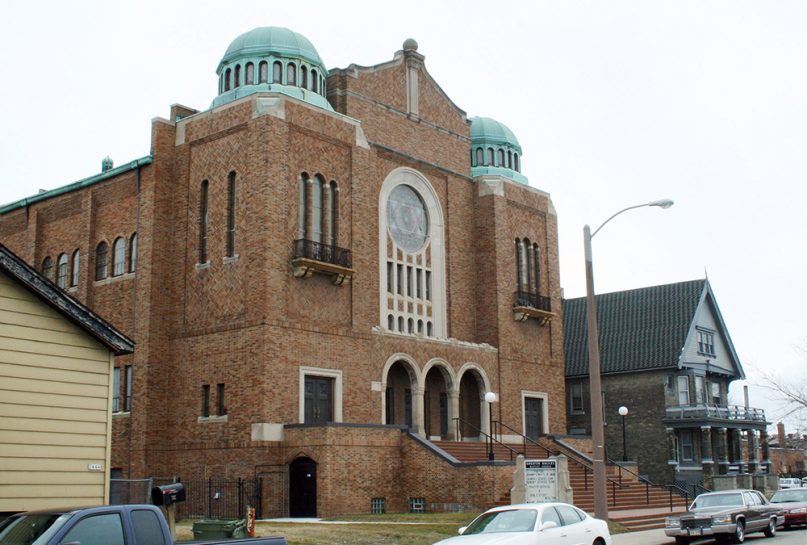
Church-run credit unions keep the faith despite challenges

Board members of the Greater Galilee Missionary Baptist Church Credit Union gather in the credit union’s office in Milwaukee on Oct. 21, 2018. Board members are Ed Murphy, from left, Jynette Hamilton, Gloria Neff, William Coffer, Ella Dunbar and Vinia Neal. The group runs the credit union on a volunteer basis. RNS photo by Katelyn Ferral
When Milwaukee’s Greater Galilee Missionary Baptist Church started a credit union in 1965, its predominantly African-American members were often denied loans, lines of credit and other basic financial services from banks.
More than 50 years later, in what is still one of the most racially segregated cities in the country, “not much has changed,” said Gloria Neff, a credit union board member and small-business owner.
Greater Galilee’s members, many of whom are elderly, still struggle to secure loans — even if they have the means to repay them.
“We’re still having the same challenges,” she said. “We’re still having the same problems.”
That reality drives board members, all volunteers, to keep the credit union going and to expand the financial services it offers.
Church members need what the credit union offers, Neff said.
“Although they pay their bills and they have the finances to pay, they still need to come to an establishment like this to get loans,” she said.
Greater Galilee Credit Union is part of a shrinking group of faith-based credit unions nationwide.
They are a distinct dimension of the credit union industry, offering a consumer-focused alternative to payday lenders and impersonal larger banks — along with shared religious beliefs.
As church attendance has fallen nationwide, some small, local church-based credit unions have shuttered.
According to the National Credit Union Administration, there are 133 active credit unions with a faith-based charter in the United States and 276 inactive ones.
Ones that remain open, like Greater Galilee, face obstacles in a rapidly changing consumer bank industry with more, costly government regulations. But Greater Galilee and other faith-based credit unions are finding ways to continue and adapt.
“At the end of the day that is the objective — to make sure the credit union is going at full force,” said Ella Dunbar, who also sits on the board.

The Greater Galilee Credit Union is run out of the Greater Galilee Missionary Baptist Church in Milwaukee. The building, which housed Congregation Beth Israel Synagogue until 1960, was listed on the National Register of Historic Places in 1992. Photo courtesy of Creative Commons
Greater Galilee Credit Union has about 200 members, all of whom must be members of the church or related to a member. The credit union is run separately from the church though it is housed in two rooms in the basement of the congregation’s home on the north side of Milwaukee. It offers passbook savings accounts and personal and auto loans, along with funeral estate planning. The credit union also hopes to offer services for preparing wills and power of attorney documents for members, said Ed Murphy, board president.
Without its services, many credit union members would likely go to payday lenders and other high-interest-rate institutions, said Murphy, especially in a state that relaxed restrictions on the payday lending industry over the last decade.
“There is a lot of predatory lending that takes place in our community,” Murphy said.
Greater Galilee’s board rates are modest compared to those of a payday lender, Murphy said. And the credit union tries to educate borrowers on the “pitfalls of those institutions,” he said. It is also planning to offer workshops on sound money management and financial literacy.
To increase business, the credit union board is considering opening up membership to people outside the church and is working on offering debit cards and checking accounts.
“We are moving in that direction; we’re just not there yet,” Murphy said. “It’s costly and you have to have a certain level of activity for it to be profitable for you. For us, being a closed shop for just a church and the church members — that’s not a large enough audience.”
Credit unions can be chartered at the state or federal level and are insured by the National Credit Union Administration and regulated by states.
Credit union officials in Wisconsin say faith-based credit unions have decreased statewide.
“It’s definitely been on the decline. A lot of them have mergered out of existence in Wisconsin,” said Mary Bliss, chief operating officer of the Wisconsin League of Credit Unions, based in Madison. “In general, they’ve had challenges in trying to grow.”
Keeping up with increasing government regulations is also costly. Leaders of the Greater Galilee Credit Union say it’s hard to keep up.
“We’re charged with carrying out the same kind of built-in controls, the internal controls, that the larger institutions have to abide by despite the fact that we are considerably smaller,” said Murphy. “We don’t have the resources … and we’re all volunteer.”

Image courtesy of Creative Commons
Costly compliance and technological changes led Notre Dame Federal Credit Union in Notre Dame, Ind., to create the Catholic Credit Union Association in 2016. Its aim is to help Catholic credit unions nationwide share resources and stay in business.
The group has about 30 member credit unions nationwide and runs a blog to educate the public and Catholic Church leadership about the benefits and history of credit unions in the Catholic Church.
Catholic credit unions have decreased in number from about 827 in 1960 to fewer than 100 today, said Robert Kloska, who works for Notre Dame Federal Credit Union and helped organize the association.
Most Catholic bishops are not aware of the Catholic social teaching that underpins the mission of credit unions, Kloska said.
It was once common to see a Catholic parish, school and credit union work together, a three-pronged institutional approach to serving a person’s soul, mind and temporal needs, said Kloska.
Now, Kloska said, “most of our bishops never talk about them.”
“I think it’s a very balanced and elegant and common-sense response to the needs of the world,” he said.
The association helps smaller Catholic credit unions comply with state and federal regulations and provides technological resources. And larger credit unions will sometimes team up with smaller ones on some loans, allowing the smaller credit unions to get some additional income from interest.
Credit unions largely started in Italy and Germany in the early part of the 19th century. Both were Catholic countries at the time, he said. The idea then spread through Catholic priests who traveled as missionaries to North America and Canada, he said.
“They saw that the people in town were not being treated well by the banks so they organized their parishioners,” Kloska said. Before long, some of their Protestant neighbors began joining as well.
Solidarity — a key Catholic social teaching — is also a pillar of the credit union’s mission, Kloska said. In this case, solidarity means people banding together for the common good.
“The purpose of a bank is to make money for the investors,” said Kloska. “The purpose of a credit union is to serve the membership.“
Rick Gonsiorek, 37, became a member of Notre Dame Federal Credit Union when he was a student at Holy Cross College in Notre Dame. He stayed on after graduation, because he says the credit union didn’t charge ATM fees and had great customer services.
Eventually, Gonsiorek, the general manager of a Catholic radio station in South Bend, made the credit union his primary banking institution and got his mortgage through it. He said the credit union’s values fit with his Catholic faith.
“I’ve been really impressed with the ways they give back to the community and the types of organizations they choose to give back to,” he said. “Many of them are Catholic organizations that are doing such great work.”
A sense of mission also drives the leaders of Greater Galilee’s credit union. Keeping their credit union alive and figuring out how to adapt is about helping their neighbors attain a higher quality of life and affording them opportunity, said board members.
“We care enough to give them an opportunity,” Neff said. “We care about them — we genuinely care. That’s the key.”
